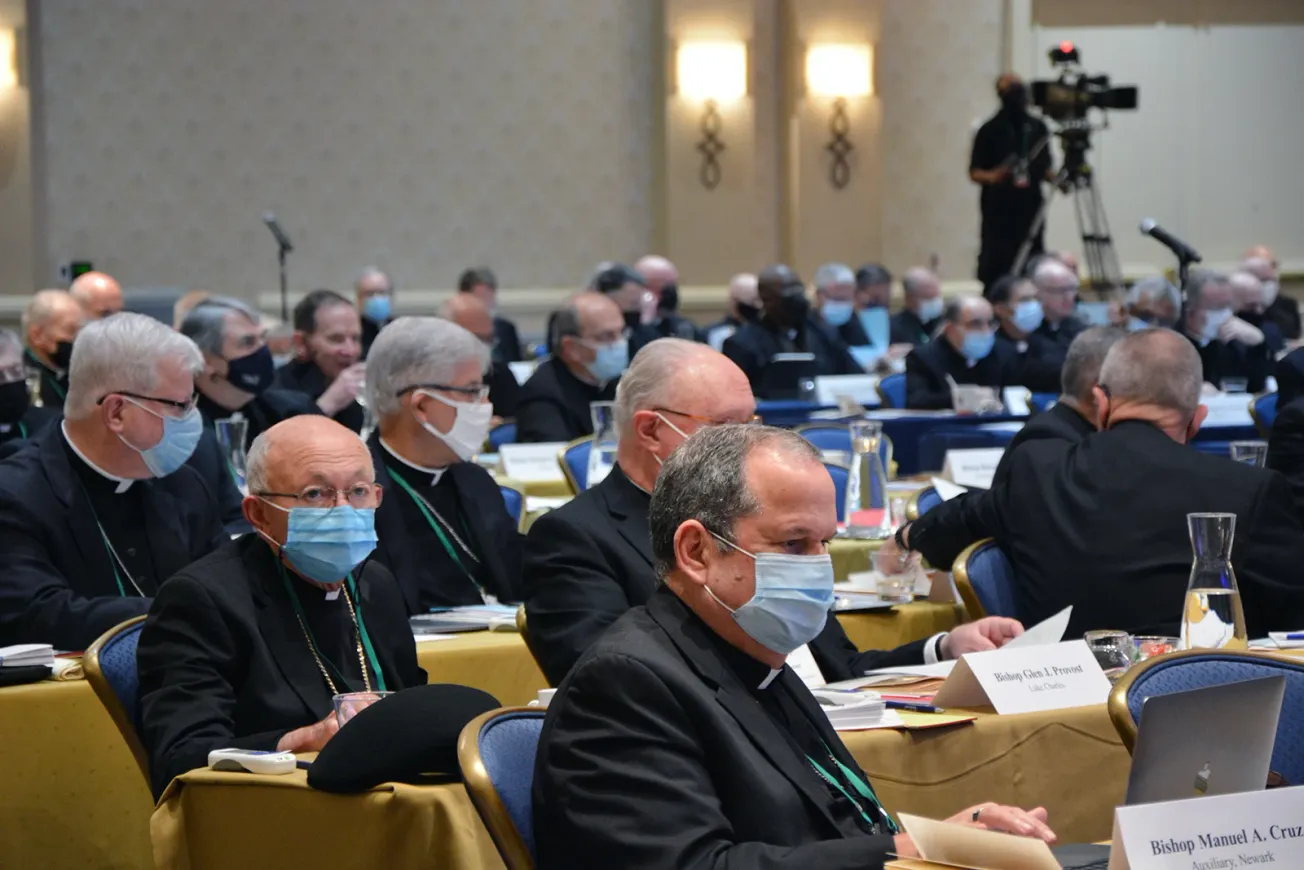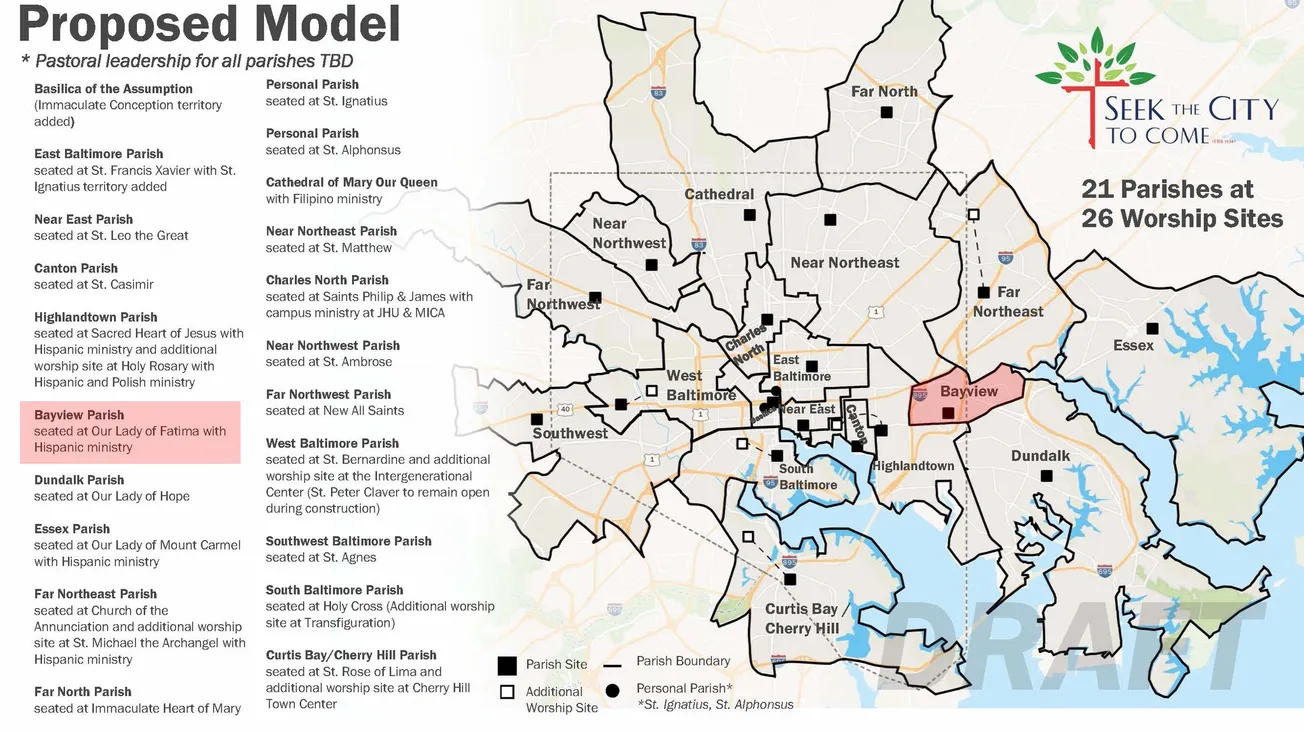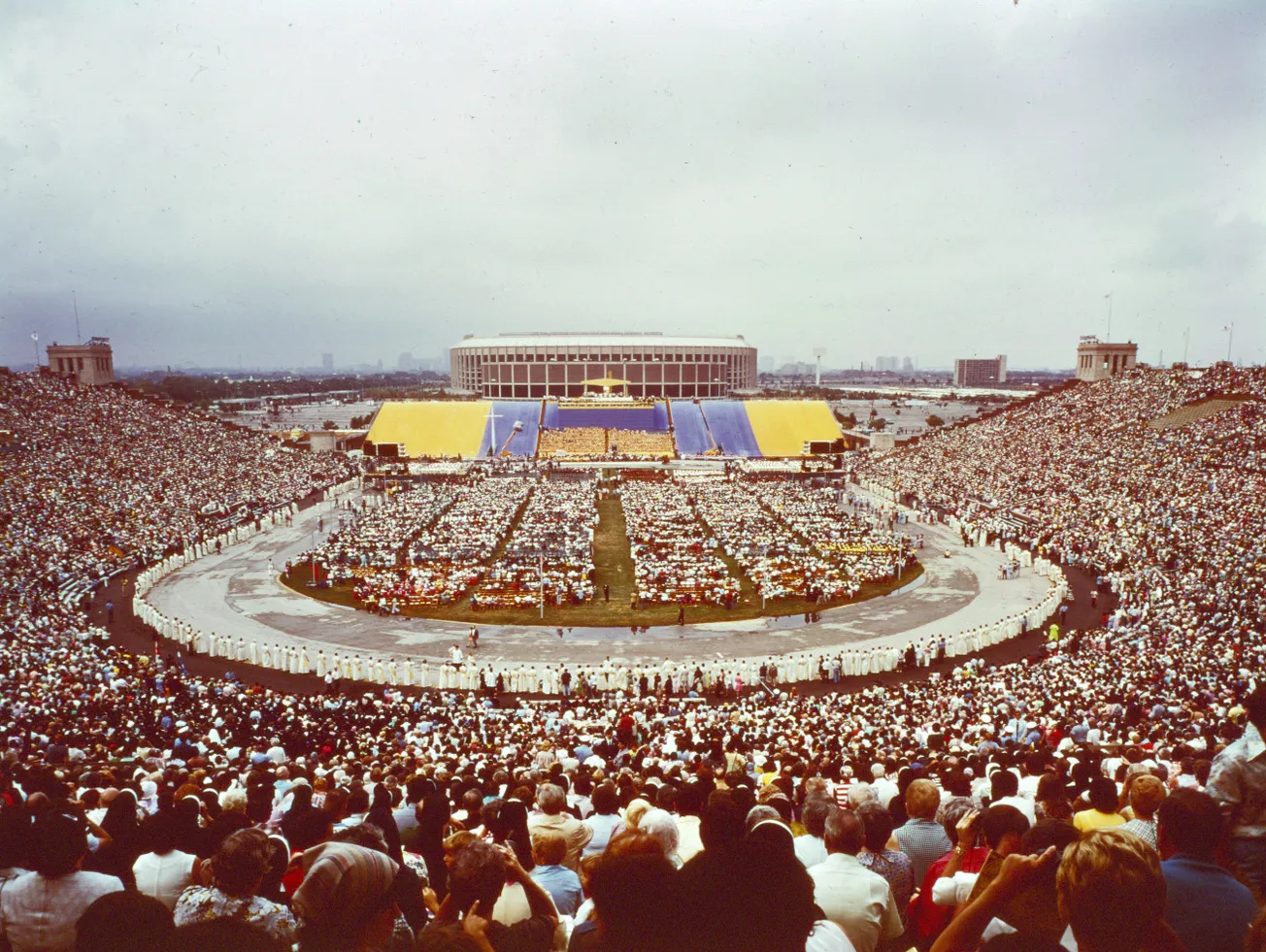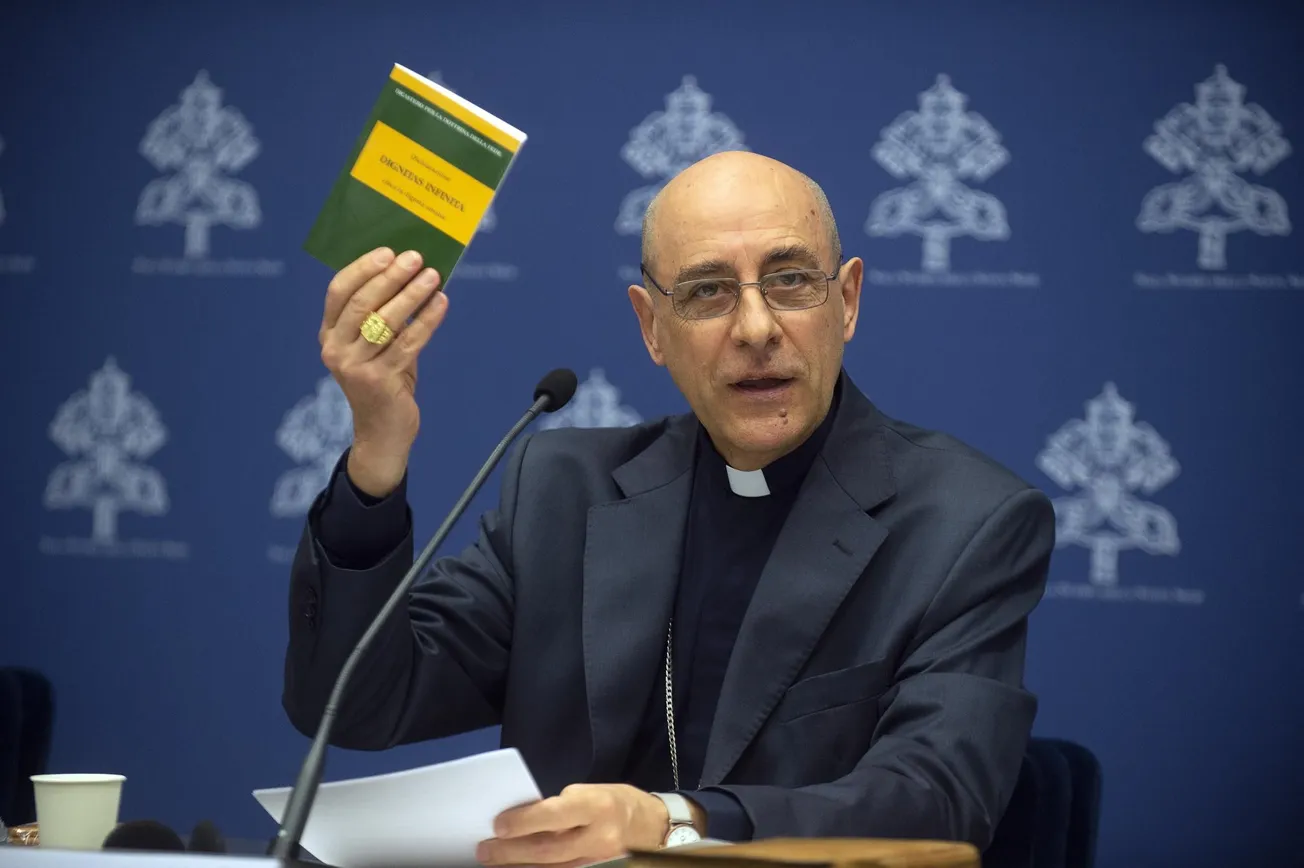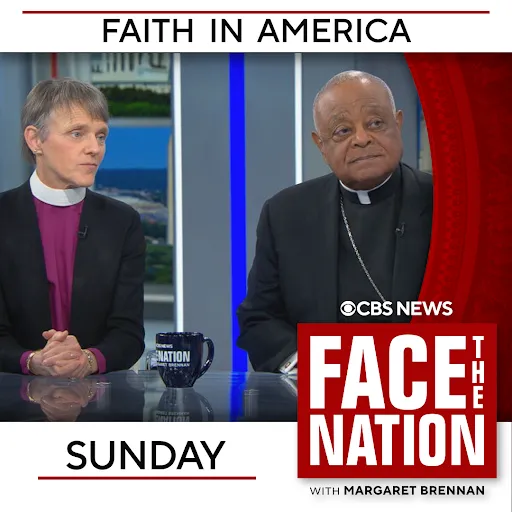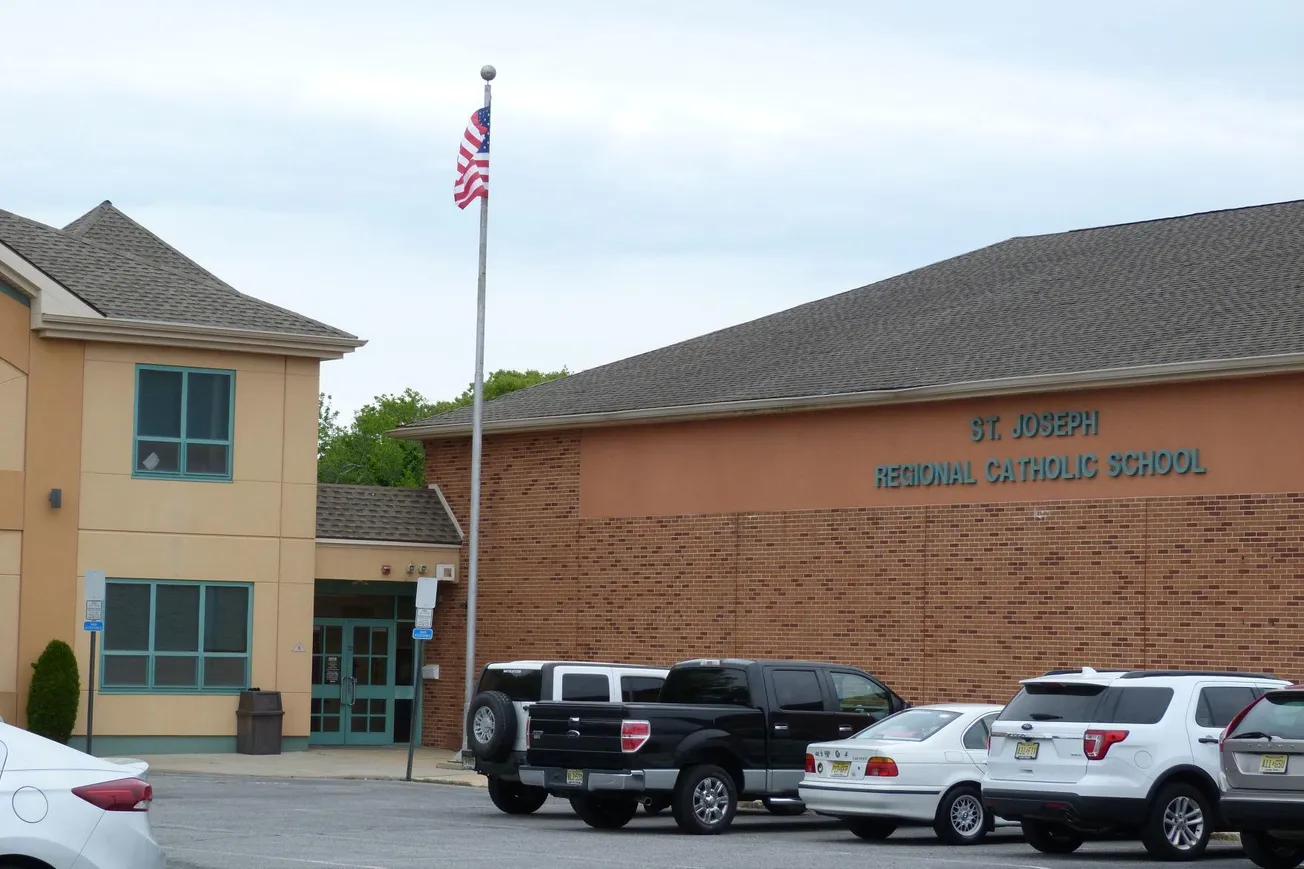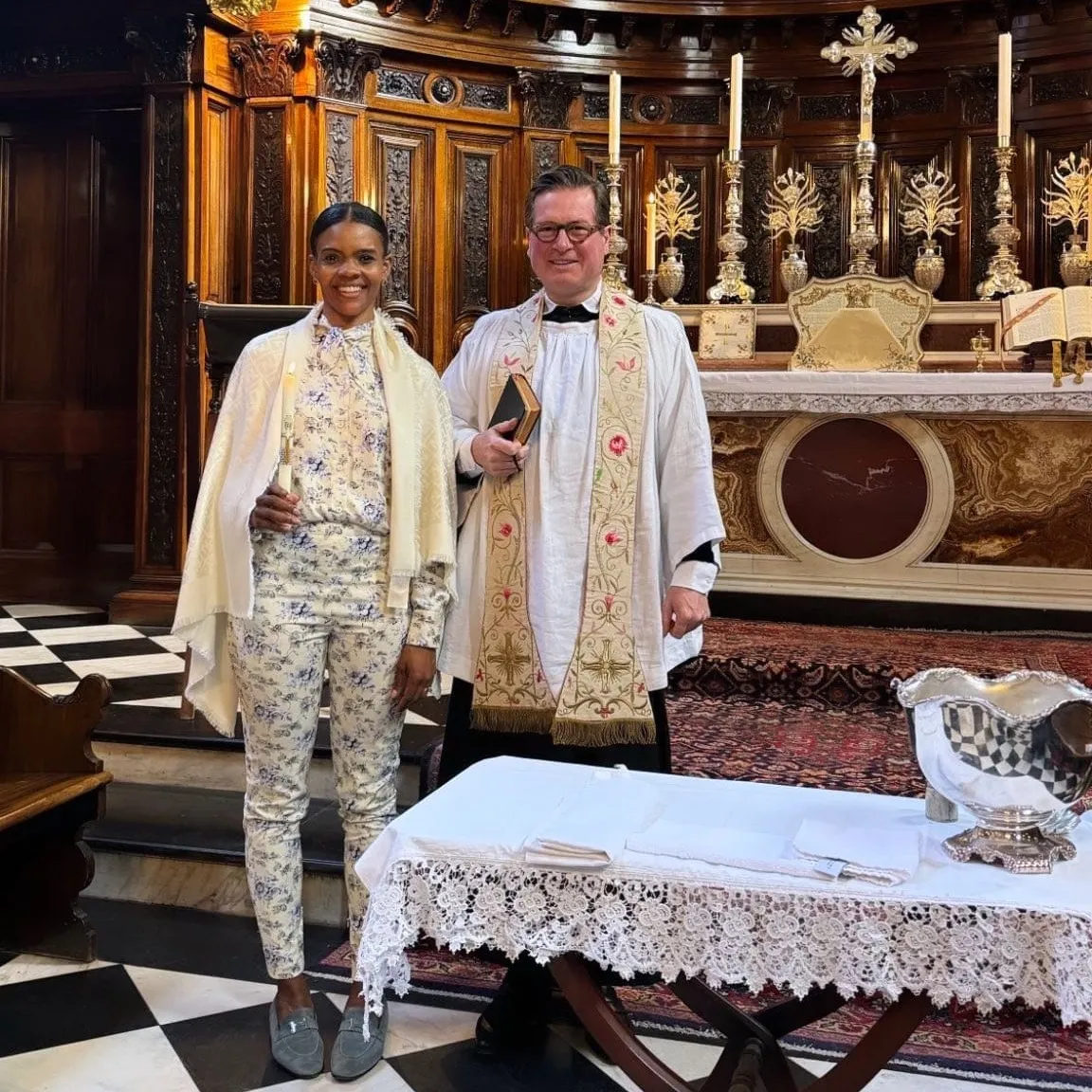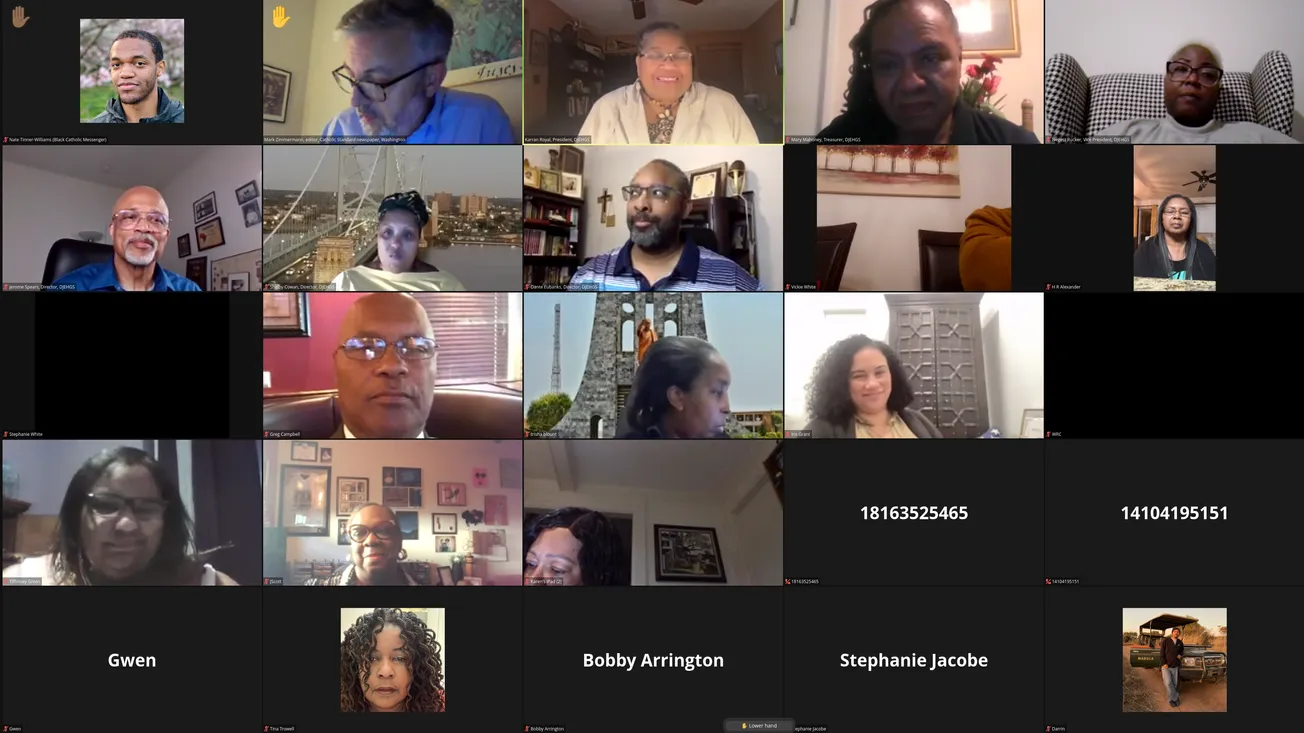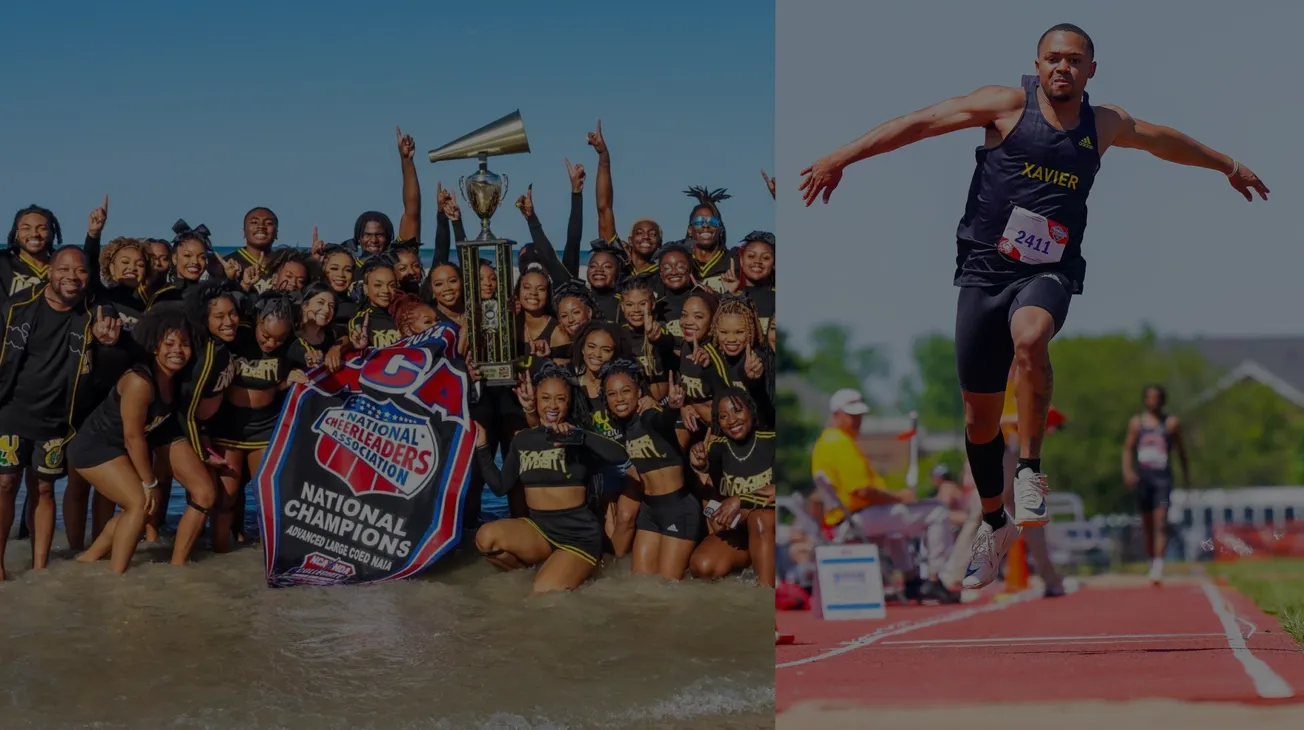America’s 400-some bishops had the opportunity to gather in-person this week for the first time in two years, though under the shadow of a “teaching document” on the Eucharist widely seen as a political power play against dissenting Catholic politicians in the Democratic Party.
By the end of the USCCB's meeting, however—and via leaks before its commencement—it was clear that no such scandal would ultimately emerge this year. Indeed, the meeting was in many ways business as usual, for better or for worse.
The assembly, which began over the weekend, included public sessions on Tuesday and Wednesday livestreamed from the Baltimore Marriott Waterfront hotel, against the backdrop of a rival event across the street led by Michael Voris and Church Militant (which managed to outdo the bishops in archconservatism).
And just across the canal, visible from the windows behind the USCCB's military booths, are our good friends from Church Militant. 😮💨😮💨#USCCB21 pic.twitter.com/Dkq5sSwB3k
— Nate Tinner-Williams 🇻🇦✊🏾🌹 (@natemup) November 16, 2021
The dual display in the nation’s first diocese was a microcosm of the larger reality of the US Church, in which it seems that, even with the reality of controversy and discord, the ultimate picture is that of an intramural exercise among White Catholics.
It seemed apparent enough that every committee represented in the public sessions is headed by a White man. Every presenter. Every commenter. Every committee nominee. Every electee. Nearly every journalist.
Gone are the days of prominent Black Catholics addressing the assembly during a time of racial unrest and anti-Black crisis. Moreover, the nation’s few Black bishops seemed invisible during the livestreams, despite the urgent need for their voices.
Bishop Shelton Fabre of Houma-Thibodaux, the one African American who is in charge of a committee—on racism, no less—did not stay for the public sessions of the meeting, given the ongoing recovery of his diocese from Hurricane Ida. (Nevertheless, no one from his committee gave a presentation during the public sessions.)
Thus, silence.
As we all know, since the last in-person USCCB gathering, an entire global movement has emerged in support of Black lives, and continues to center in the national discussion about the proper way forward.
Just weeks before the descent upon Baltimore, the USCCB president himself, Archbishop José Gómez of Los Angeles, issued a diatribe against said Black Lives Matter movement (and others), calling them “Marxist” replacements for “Judaeo-Christian” mores.
A petition rebuking him for the screed has now topped 13,000 signatures, and on the first day of public sessions, the National Black Sisters’ Conference issued a letter asking him to rescind the statement and enter into a dialogue.
During the public sessions in Baltimore, neither effort was mentioned.
The committee elections featured familiar names, including Bishop Steven Lopes of the Anglican Ordinariate—who was recently involved in the prevention of a Knights of Peter Claver council at one of his parishes—as the new head of Divine Worship. (He won by just one vote.)
Bishop Steven Lopes of the US Anglican Ordinariate narrowly defeats +Rozanski of St Louis for chair of Committee on Liturgy. #USCCB21
— Nate Tinner-Williams 🇻🇦✊🏾🌹 (@natemup) November 16, 2021
Bishop Robert Barron of Los Angeles, who just before the KPC incident had entered into polemics—concerning Critical Race Theory—against the parishioner organizing the council, was elected chair for Laity, Marriage, Family Life, and Youth, succeeding noted partisan Archbishop Salvatore Cordileone of San Francisco.
Even so, there were some bright spots during the public portion of the gathering, which should not go without mentioning. If African Americans were not heard from during the livestreams, other important voices managed to break through.
Perhaps the USCCB’s most encouraging program, the Catholic Campaign for Human Development (CCHD), held its annual ceremony for the Cardinal Bernardin New Leadership Award on the first night of the public sessions, with the prize going to a Black Catholic for the second year in a row.
Ogechi Akalegbere, a Nigerian-American immigrant in the DC area, received the award for her work with low-income and immigrant families via the Maryland-based (and CCHD-funded) Action In Montgomery, and for her racial justice activism, service in Catholic education, and work at her local parish.
“I am proud to be a part of groups like AIM, which allow us to be those ‘Collective Samaritans’ to our neighbor,” she said in her remarks, employing a phrase Pope Francis used to refer to George Floyd protesters.
On day 2 of public sessions, Auxiliary Bishop John Dolan of San Diego, one of the nation’s few bishops to acknowledge Black Catholic History Month on his personal social media in the past few weeks, also made sure the bishops heard about it during the public assembly—a change in pace from last Fall’s virtual gathering, which coincided with the 30th anniversary of BCHM but did not feature a mention of the event from any bishop, Black or White.
Dolan first highlighted another petition concerning Black Catholics, an initiative led by parishes in Baltimore to expedite the canonization causes of the six African Americans on the path to sainthood. A letter-writing campaign to Pope Francis was launched earlier this month, and a parallel online petition has also been released.
“I would encourage us to up the ante on our part,” Dolan said, not directly endorsing the campaign but encouraging “petitions of prayer” and diocesan events in cathedrals across the country.
Following presentations on new sainthood causes—of White Catholics—to be promoted by the US bishops, +John Dolan of San Diego (@ChristInOurNei1) cites #BlackCatholicHistoryMonth and the recent petition to Pope Francis in support of the 6 venerated African-Americans.#USCCB21 pic.twitter.com/S5i7uFPETz
— Nate Tinner-Williams 🇻🇦✊🏾🌹 (@natemup) November 17, 2021
Dolan’s comments immediately followed presentations on new canonization causes from Louisiana, all of which concerned White Catholics. He reminded the assembly that Black Catholics also need support for their Servants of God and Venerables, as there are presently no beatified or canonized African Americans.
Later, during discussion on the Eucharist document and the accompanying four-year Eucharistic Revival, Dolan highlighted the fact that the planned National Eucharistic Congress in 2024 will coincide with the 60th anniversary of the first official vernacular Mass in the United States, at the 1964 National Liturgical Conference. He also noted that the celebration featured a groundbreaking Black Catholic song, “God Is Love”, from Black priest Fr Clarence Rivers.
+John Dolan (@ChristInOurNei1) notes that 2024 will be the 60th anniversary of the first official US Mass in English.
— Nate Tinner-Williams 🇻🇦✊🏾🌹 (@natemup) November 17, 2021
Mentions its inclusion of Fr Clarence Rivers' conducting his own "God Is Love", an early Catholic composition utilizing African-American sacred music.#USCCB21 pic.twitter.com/ln8oPuvYnC
His proposed amendment—to explicitly connect the title of the Congress to the liturgical aspect of Eucharistic coherence—was passed over, but his voice was indeed heard.
Shortly after his comments, the Eucharist document met with overwhelming approval, with only eight bishops voting against. (One can debate whether those might be bishops who felt the document should have stayed political, those who felt its political origins disqualified it from approbation altogether, or some combination thereof.)
Perhaps the main focus of this year's gathering, the @USCCB approves its controversial teaching document on the Eucharist by a vote of 222-8.
— Nate Tinner-Williams 🇻🇦✊🏾🌹 (@natemup) November 17, 2021
Three abstentions.#USCCB21 pic.twitter.com/NRueoRuvdf
Some hours later, after extended sessions on sex abuse, abortion, and the ongoing 2023 Synod process, the bishops’ five main social justice arms were crammed into the final hour of presentations, with Gomez asking each of them to be “brief”.
These included the CCHD as well as Catholic Relief Services, which earlier in the assembly added three new board members—including Military Archbishop Timothy Broglio, who last month touted vaccine exemptions for his flock, and Bishop Donald Hying of Madison, who just last week banned vaccine clinics on diocesan property.
In case you were wondering which vendors are featured just outside the main conference room here at #USCCB21... 😮💨 pic.twitter.com/pyFAcwTpo5
— Nate Tinner-Williams 🇻🇦✊🏾🌹 (@natemup) November 16, 2021
Catholic Charities USA was also part of the presentation crunch, followed by the Catholic Legal Immigration Network and the bishops’ related Committee on Migration.
The final event of the public sessions, a second press conference, featured Bishop Kevin Rhoades of Fort Wayne-South Bend, one of the main architects of the Eucharist document and its former vision as a GOP-influenced ultimatum.
Therein, he claimed that the creation of the document was a display of “synodality”—a shocking (and ironic) claim, given that a warning from the Vatican is likely the reason the document was toned down to its saccharine final state.
Perhaps unsurprisingly, Rhoades also noted that the document will not be sent to the Vatican for approval, as it merely restates existing Church teaching.
One wonders then, of course: what exactly is the point of the initiative, which will cost the conference a hefty $24M?
Congress architect Bishop Andrew Cozzens of Crookston joined Naumann in claiming that the Eucharistic focus is needed because of a national drop in Mass attendance—a more than slight pivot from the prior justification originating with the election of President Joe Biden.
(President Gomez also denied this connection during the press conference on night one, despite the fact that he himself set off the controversy exactly one year ago.)
On the topic of the much-discussed 2019 Pew study on the Eucharist, Cozzens said the bishops will conduct a new survey of their own as part of the revival. (An interesting exercise in creative chronology, to say the least.)
The Eucharistic Revival will also involve a new study on belief in Real Presence, sponsored by @McGrathND.
— Nate Tinner-Williams 🇻🇦✊🏾🌹 (@natemup) November 17, 2021
The 2019 @PewResearch survey, which sparked the ongoing controversy in the US Church, was widely criticized after the fact for its wording of questions.#USCCB21
Among Black Catholics, and perhaps summing up the response to the Fall General Assembly from the average lay Catholic, the sentiment seems clear: the Eucharist isn’t the problem.
The USCCB’s steadfast refusal to give more than lip service to the larger body of Catholic Social Teaching, on the other hand, most certainly is.
Editor's note: A previous version of this story incorrectly identified Archbishop Joseph Naumann as the prelate at the second press conference describing the origins of the document on the Eucharist. The error has been corrected.
Nate Tinner-Williams is co-founder and editor of Black Catholic Messenger, a seminarian with the Josephites, and a ThM student with the Institute for Black Catholic Studies at Xavier University of Louisiana (XULA).


